
Reshaping Vegan Masculinity
Being vegan is more than just a diet. Some call it a mindset, philosophy, or lifestyle. Veganism is connected to morals and ethics, as it requires a non-violent way of life in all of its domains.
Throughout the years, veganism has become a social phenomenon with a specific cultural aura built around it: dedicated culinary books, websites, cafes, and food festivals. Veganism kept on becoming more prominent in society in the past decade (Greenebaum, 2012). Identifying as a vegan in public is an important identity statement (Greenebaum, 2012).
Despite the drastic differences that exist among vegans regarding their motivations to go plant-based, for instance, health or ethics, there are still some strong stereotypes attached to the notion of veganism. Vegan often means ‘green’ and non-cruel, but also effeminized; partly due to the mix of colonial history, online culture, and the propagandist influence of alt-right (Greenebaum, 2012). However, this is a very narrow view, not representative of what vegans can be like.
This paper analyzes the communication on the Instagram account of @nimai_delgado. The viral fitness influencer is promoting his workouts while stressing that he follows a vegan lifestyle and diet. The article is going to demonstrate how he rebrands the ‘vegan identity’ message. By doing so, the influencer targets a specific niche of people interested in fitness and veganism to sell his sports supplements. The blog becomes a space where vegan ethics meet commercialization logic. The debate emerges: how ethical is it to exploit your vegan identity which is supposed to encompass a whole range of views on morals in order to monetize and profit from your followers who sincerely want to improve their lifestyle.
The Vegan bodybuilder
Nimai Delgado is a vegan professional bodybuilder. The sports influencer has built his reputation due to his participation in the IFBB Professional League in the Men’s Physique category and his life-long meatless diet (Schmaltz, n.d.). Adopting a purely vegan lifestyle a few years ago, Delgado became a "living refutation of the stereotype that you can’t build quality mass without meat and dairy protein" (Schmaltz, n.d.). Nimai claims to never have eaten meat due to his upbringing in a Hindu household.
Delgado is active online as well as offline. His Instagram account has over 600,000 followers. The blog features recent fitness updates, goals, motivational posts, and promotion materials for his fitness supplements. The influencer has built his platform in a way to be a living commercial for his products he can later sell to a broad network of his followers. Delgado's targeted audience is people willing to improve their sports achievements with a plant-based diet. They rely on the influencer who daily exploits and moralizes his lifestyle to become a vegan fitness icon for profit attraction.
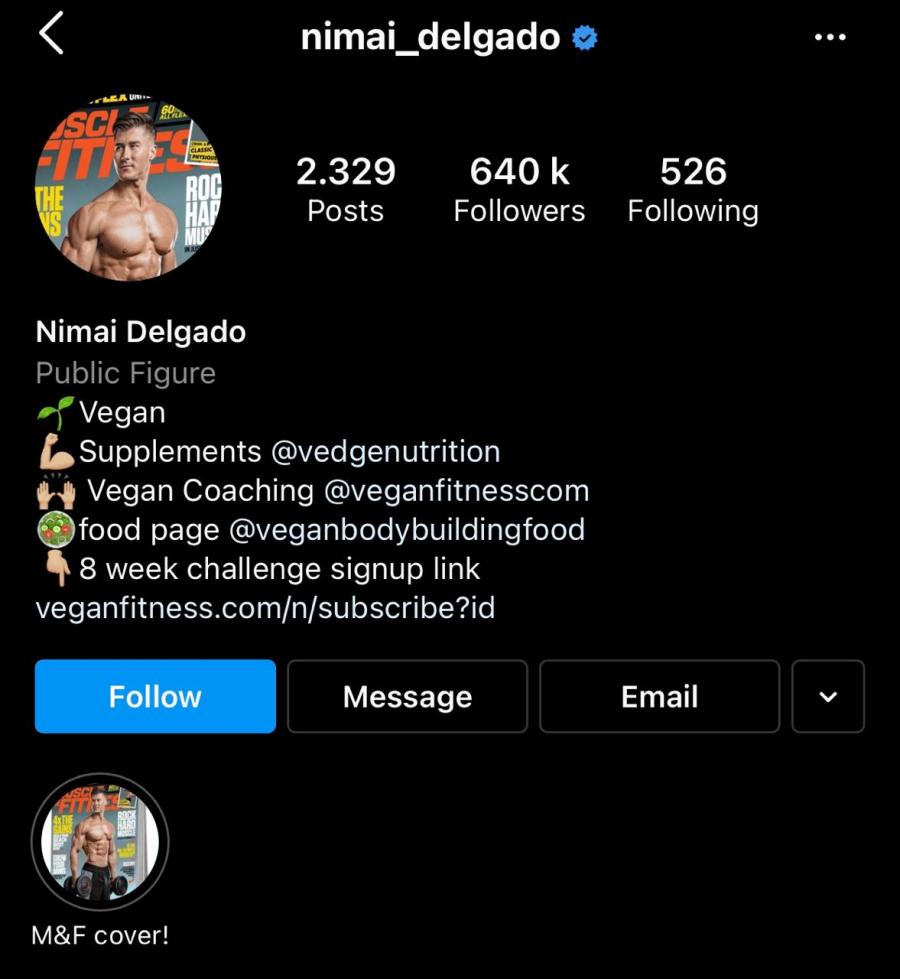
Figure 1: Delgado's Instagram profile.
The first thing Delgado communicates about himself is his vegan identity. In his bio on the platform, Delgado mentions 'vegan' (Figure 1). Below this indication, the influencer links the users to his supplement company, Vegan Coaching, of which he is a part, his food page, and his 'vegan fitness' challenge. @nimai_delgado's profile picture and the only Instagram 'highlight' indicate his successful career as a bodybuilder, being on the cover of a well-known fitness magazine.
Delgado's content mostly deals with pictures and videos of his up-to-date physical shape. At the same time, he highlights his vegan diet by posting his food and sharing his love for plant-based products in the description section. Under his posts, Delgado often uses hashtags such as #vegan, #veganfood, #veganrecipies, #healthyfood, #veganfitness, #veganbodybuilding, #plantbased, #veganbreakfast, #veganfoodshare, #plantbaseddiet, #inspiration, #healthiswealth, #veganfitnesschallenge. In this way, Delgado increases the posts' searchability and links them to similar content.
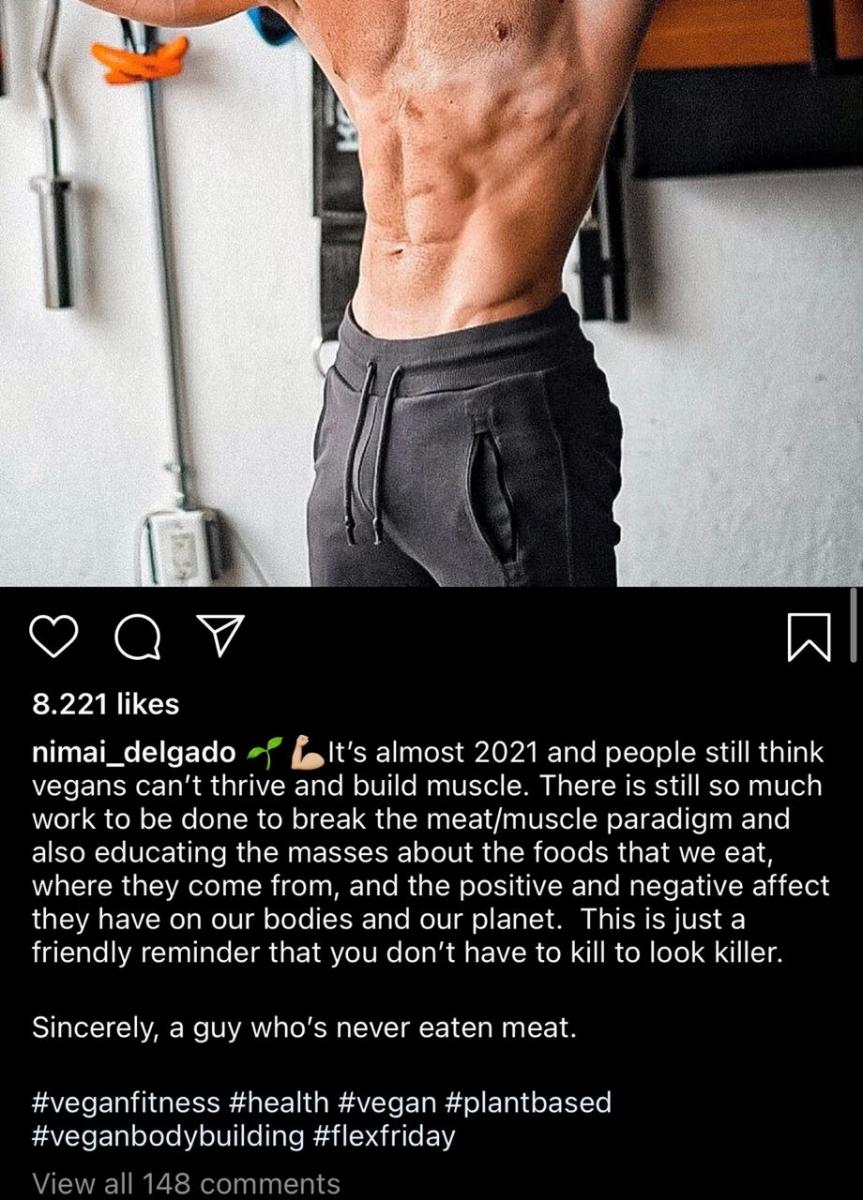
Figure 2: Delgado sharing his thoughts on veganism.
Delgado tries to break the stereotype that one cannot build muscle without consuming meat, fish, eggs, and dairy products. He says 'you don't have to kill to look killer' (Figure 2). Delgado references his diet in a playful way. He often mentions soy as his source of amino acids, fiber, potassium, iron, and other essential elements. He uses his own body as a promotion of his lifestyle.
The feminization of men based on the consumed food products has existed in our society throughout history (Gambert, 2018).
The influencer's Instagram profile embeds what is thought of as 'masculine' in society with his body shape, great fitness results, and his strong workout performance. It's not just that the man in the pictures appears strong and confident, he also makes sure to share the successful results of his work. Delgado's posts often feature his life story -- risking it all to follow his passions, building a profitable business, and achieving top sports awards (Figure 3).

Figure 3: Delgado sharing his motivational success story.
Nearly every post by Delgado features a display of food in combination with his body type. Often, he adds links to promote his products to help others achieve higher fitness results. Following this posting strategy, Delgado achieved a successful online career as a vegan fitness influencer. Throughout years of active Instagram usage, he has managed to build a network of loyal followers, every post being liked tens of thousands of times. Delgado's content collects hundreds of comments and his 'tagged' section is full of pictures of users following his recipes and fitness routines, or sharing his images as fitness and vegan motivation.
Veganism and masculinity
Delgado actively positions himself as a vegan fitness blogger. This is crucial for the message the influence brings across the online platforms. Undoubtedly, veganism is something much larger than just what one eats (Greenebaum, 2012). The Vegan Society, the oldest vegan organization in the world, has defined veganism as follows: “a philosophy and way of living which seeks to exclude—as far as is possible and practicable—all forms of exploitation of, and cruelty to, animals for food, clothing or other purpose [...]” (The Vegan Society, n.d.).
Promoting his vegan identity, Delgado becomes a public advocate of the lifestyle. His active promotion of veganism as the basis for his fitness contributes to the social understanding of veganism as something that makes you fit, strong, and 'masculine' in a stereotypical social sense. This is crucial because the connection between masculinity and a plant-based diet has not always been there historically. On the contrary, for centuries, a plant-based diet was regarded as a factual antonym to masculinity and physical strength (Gambert, 2018).
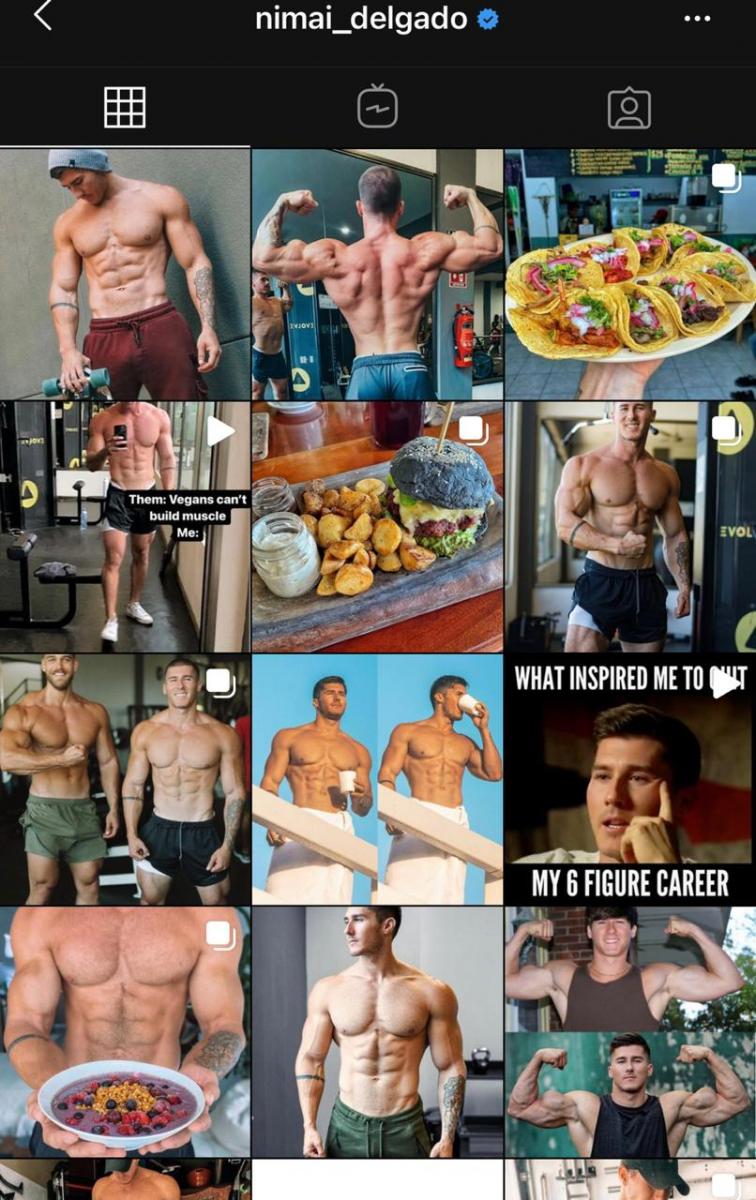
Figure 4: Delgado's 'masculine' Instagram profile.
The feminization of men based on the food products they consume has existed in our society throughout history (Gambert, 2018). Debates on masculinity go beyond being about gender alone, but rather about the nostalgic ideas that everything was supposedly better in the past and the desire to make societies 'great again' (Varis, 2018). In the contemporary societal context, some of the tropes which make ‘the real man’ revolve around particular kinds of dietary preferences, for example, meat-eating vs. veganism, or dairy milk vs. soy, or any other plant-based drinks (Gambert, 2018).
The milk-drinking discourse often revolves around idealized masculinity and whiteness (Gambert, 2018). Food preferences determine political stances, racial purity, and belonging to certain social categories (Kestenbaum, 2017; Gambert, 2018). For instance, in online culture, a milk-including diet has been associated with the ‘maleness’ of alt-right, in line with the Pepe the Frog memes and ‘okay’ emojis (Gambert, 2018). Your dietary choice can lead you to participation in culture wars (Varis, 2018).
"The message is that real men don't consume soy or soy milk; they eat meat and drink cow milk" (Varis, 2018)
On the other hand, people who prefer to abstain from drinking milk and consuming animal products as a part of their diet are often labeled ‘SoyBoys’ as a supposedly emasculating term. Soy was specifically targeted because of its association with contemporary Asian culture and claims about soy’s phytoestrogens which, when consumed, supposedly lead to a reduction in testosterone levels, making men weaker (Gambert, 2018).
From #SoyBoy to #VeganFitness: Identification of veganism online
Delgado has mastered the professional use of his Instagram account. Online identities are performed “in chains and skeins of activities and interactions” (Leppänen et al., 2014). His posting is in perfect accordance with his main focus on veganism and fitness. To bring his mediatized image across, Delgado uses both “resources provided by language(s), but also other semiotic resources” (Leppänen et al., 2014) available online.

Figure 5: Delgado's story section on Instagram.
Communication on social media uses sounds, moving and still images, textual forms that can be used for decontextualization and recontextualization of the message (Leppänen et al., 2014). The range of options offered by the platforms contains “textual forms and patterns, still and moving images, sounds and cultural discourses” (Leppänen et al., 2014). To maintain a convincing profile, Delgado uses all the affordances available on Instagram. The influencer posts colorful and well-staged pictures that make his online profile attractive and likable. @nimai_delgado uploads informative IG TV videos in which he shares his workouts. Delgado reinforces the message with the caption, links to his other accounts, and the hashtags at the end of each post (Figure 5).
In the story section, Delgado displays his everyday life with the same focus as in his profile. He shares motivational content, images of his food, and his fitness shape. Delgado is quite active on the platform (2,327 posts as of 11.11.2020). He follows the guidelines of Instagram that require activity in the story section for extra attention from the followers. In his stories, Delgado uses the tags of others, attaches the links to the thematic websites, and keeps on promoting his active vegan lifestyle (Figure 6).

Figure 6: Delgado's story section on Instagram.
By keeping his account up to date, Delgado displays the discourses of fitness, masculinity, and health. His Instagram account is a space where interwoven semiotic materials reshape the message of veganism from feminized to masculine. Every detail of his profile contributes to the overarching concept of vegan fitness which becomes “socially significant and culturally valuable” (Leppänen et al., 2014) in the immediate communication with the broad network of followers involved. With his Instagram account, Delgado invests in building his online identity. He then uses his media image to contribute to and reshape the vegan masculinity discourse.
Following a history of stereotypes connected to plant-based living, the internet has become one of the main battlefields for reclaiming the various kinds of vegan identities. Micro-celebrities with their networks of followers use the markers of recognition to rebrand veganism in line with a more diverse discourse than that of the effeminizing #soyboys.
A few years ago, the #SoyBoy went viral on Twitter and beyond, generating a vivid discussion around the notions of masculinity and belonging. Using collective efforts, some have managed to recontextualize #SoyBoy. Women, men and nonbinary people have reclaimed the hashtag to embrace and celebrate their identities as a tool of empowerment (Gambert, 2018). Numerous male vegan athletes and bodybuilders have also joined the reclamation stream sharing their fitness results achieved following their plant-based diet.
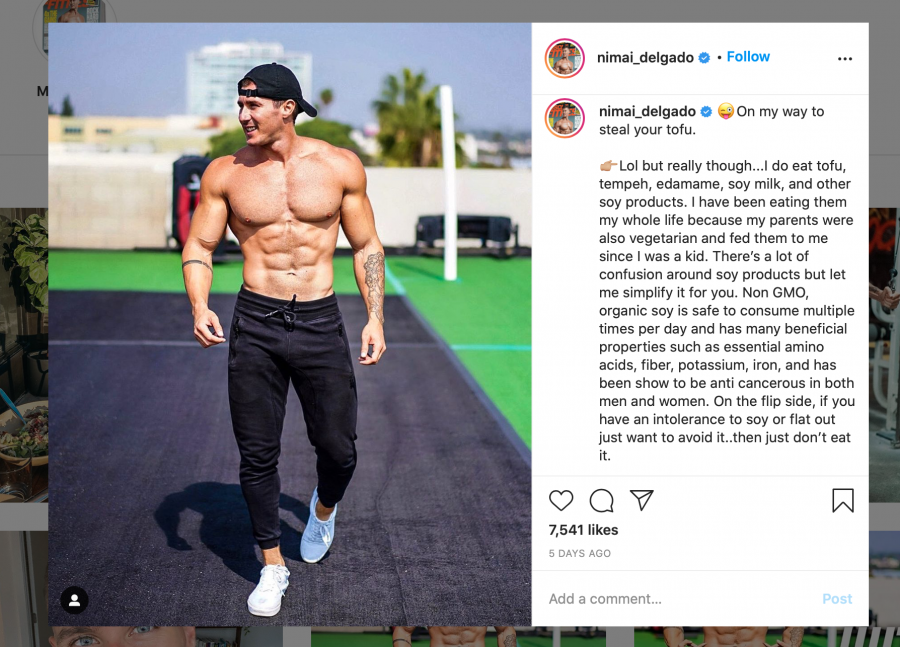
Figure 7: Delgado rebranding the soy-containing diet.
Articulating his vegan lifestyle and displaying his excellent fitness performance, @nimai_delgado reshapes the online representation of veganism as a movement for strong and successful sportsmen (Figure 7). By displaying his life philosophy, motivation tips, daily fitness, and nutrition habits, the influencer shows that “a vegan identity needs to be understood as more than a philosophy or way of ‘being’. It needs to be constructed by what one does” (Greenebaum, 2012). Signifying his affiliation with the vegan movement, Delgado recreates a similar effect as the reclamation of the SoyBoy hashtag achieved. The influencer connects the discourses of masculinity and a plant-based diet, challenging the centuries-old colonial stereotypes and the alt-right rhetoric.
Negotiating the identity
When constructing an online identity, influencers need to appear authentic. Authenticity is a performance either accepted or rejected by others (Peterson, 2005). In the case of @nimai_delgado, his authenticity is generally accepted by the public, judging by the number of followers (638k, 02.11.2020) and the account activity he has on Instagram.
By communicating his individuality to others and shaping it as an authentic message, Delgado engages with identity work and “impression management” (Goffman, 1959; Greenebaum, 2012). Impression management of micro-celebrities deals with the way they construct their online persona. The influencers communicate it to others in their digital network while performing social interactions (Greenebaum, 2012).
In social media settings, promoting veganism as a vital part of your identity serves as a niche to commercialize and sell vegan products.
The goal of impression management is to influence one’s audience to be viewed in a particular way (Greenebaum, 2012) which is crucial for influencer self-marketing. The construction of the authentic self is always relational and context-dependent (Greenebaum, 2012). The influencer’s online identity should be looked at as a whole. @nimai_delgado communicates his authentic self by promoting his lifestyle, excellent sports performance, entrepreneurial initiatives, and his fit appearance. A central role in all these identity aspects is played by veganism. The message he communicates through his posts is that while adhering to a vegan lifestyle in conjunction with using Delgado's supplements one can still become as fit, strong, and powerful as he is.
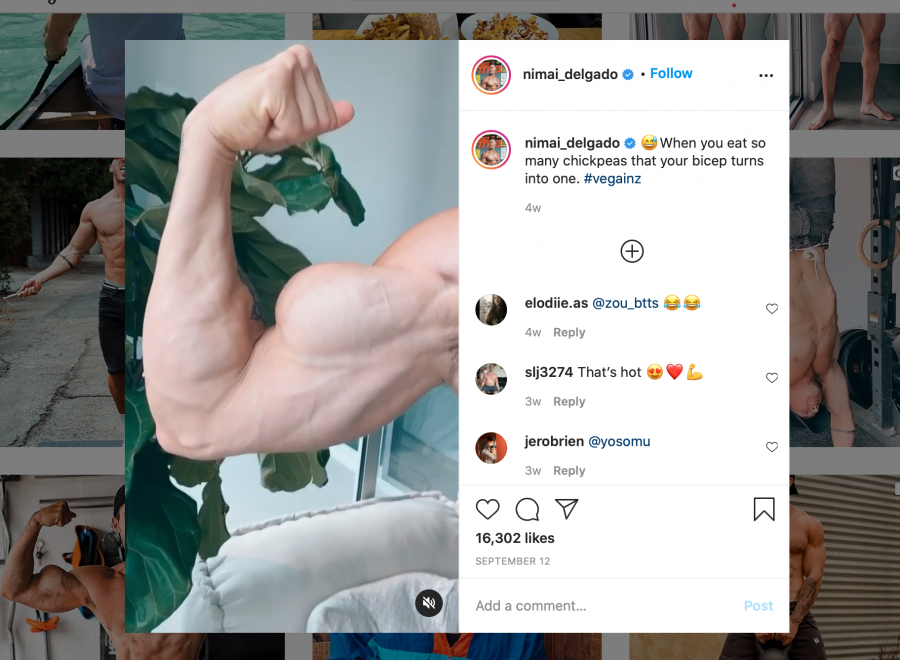
Figure 8: Delgado presenting his fitness diet in a playful manner.
Delgado keeps up with the veganism theme throughout his activity for a reason. The sense of a social network is strong among strict vegans (Cherry, 2006; Greenebaum, 2012). According to Cherry (2006), the community feeling encourages them to follow a purely vegan lifestyle.
Based on Greenebaum's (2012) analysis of the vegan identity, there are a few prominent features that @nimai_delgado includes in his online communication. In terms of messaging, the influencer strategically targets everyone who follows a plant-based diet and does not distinguish between “health vegans, environmental vegans and ethical vegans” (Greenebaum, 2012). Delgado does not voice any issues related to the struggles vegans might face when adopting a new lifestyle. On the contrary, his communication has a predominantly positive tone. He presents veganism as a lifestyle, as a part of his identity, and as a tool that helped him achieve his physical condition. In Delgado's adaptation, veganism can improve one’s physical health and fitness shape.
Delgado describes his activity as serving a higher purpose of “spreading awareness and helping people to get healthy” (Delgado, 2020) Under one of his posts, he adds: “You never know who is watching. You never know who you might inspire. You never know how much of an impact you may have. You could save someone’s life” (Delgado, 2020). Delgado, therefore, does not only target users who are already vegan, but also those who are attempting to transition to the vegan lifestyle. Analyzing the semiotic means Delgado uses in his posts, he positions his Instagram account as a motivational medium for all those who visit his page.
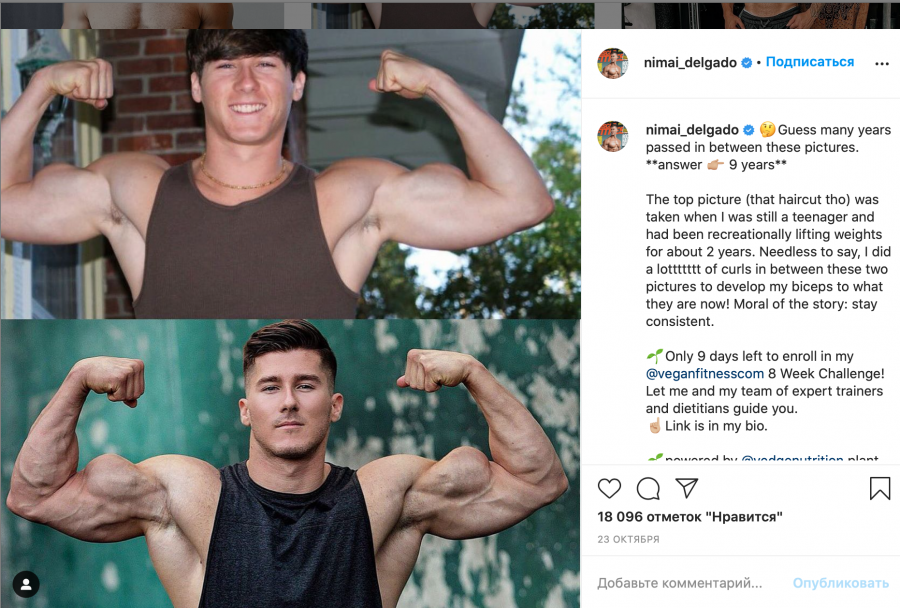
Figure 9: Delgado's promotional 'vegan challenge' post.
In one of his posts, @nimai_delgado says that he has quit his 6 figure engineer career to raise people’s awareness. In this way, Delgado promotes the message that he is a successful, fit, young, rich, and, importantly, a vegan influencer and you can be as well if you follow his dietary plan, and reach the same level of awareness. However, by promoting his successes and achievements, Delgado does not purely aim at all those who just want to be plant-based and fit. Significantly, he also targets those who want to be successful and achieve something similar in life.
Ethics and commercialization of veganism
Veganism is "something larger than just what one eats" (Greenebaum, 2012). According to Greenebaum (2012), an ethical vegan is a person who "adopts a vegan diet for moral, ethical and political reasons". In social media settings, promoting veganism as a vital part of your identity also serves as a niche to commercialize and sell your vegan products. Therefore, ethical debate emerges to what extent veganism can be used as a trampoline for social media monetization.
If veganism heavily relies on morals, we can ask to what extent can one use it for commercialization. Users are confronted with a rather wicked combination of promoting a certain type of ethic on the one hand and selling goods and making a profit on the other. This process is presented as a 'good intention' to spread the vegan lifestyle while being a purely pragmatic business model.
Engaging the audience
Just as any public person using the media, @nimai_delgado shapes his message in a way to target a certain audience. He makes veganism look very attractive. The core of his message is that Delgado is not just fit -- he is also mindful, successful, and rich. He has the qualities attributed to what society regards as ‘masculine’.
Delgado's online identity has allowed him to build a network of different groups of people who are into veganism, fitness, motivation, or all of the above. He positions himself as a role model for each one of these categories. He does it because he is the face of his vegan supplements and coaching business. Delgado's primary intention might be to show people that veganism can be associated with physical strength. However, highlighting this notion allowed him to reshape his Instagram account into the commercialized platform that profits from its network.
Conclusions: using veganism for one's benefit
This article has looked into the Instagram account of @nimai_delgado whose media message deals with vegan masculinity. Using the platform’s affordances and recontextualization, Delgado has organized his social media image to become living proof that veganism can be associated with masculinity and physical strength.
Delgado has dedicated his account to displaying his fitness and nutrition habits, as well as to becoming a motivational spokesperson for vegan sports. Delgado rebrands veganism as key to a healthy fitness routine. By doing so, he attracts the network of sports enthusiasts who either already follow or want to follow the plant-based fitness diet and search for the motivation to make the first steps. Delgado’s account can appear quite helpful since he displays additional benefits of his vegan lifestyle, such as success, success in sports, multiple businesses, delicious food, and traveling around the world.
By creating a specific aura on his Instagram account, Delgado gets the additional benefit of dedicated customers for his brand products. Using the appeal of a masculine fitness guru, he serves as a living commercial for selling his vegan supplements. Therefore, for Delgado, maintaining his vegan bodybuilder appeal, while staying active online, is strategically important for building a profit and selling his products.
The debate occurs whether reshaping vegan masculinity is done with the intention to 'enlighten' the masses or to profit from them. Ethical veganism based on morals seems rather incompatible with setting up one's platform to profit from vegan followers. Therefore, in the contemporary media sphere, the exploitation of vegan identity for commercial purposes appears problematic.
References
Delgado, N. (2020). Personal Instagram account @nimai_delgado.
Gambert, I. (2018). From Rice Eaters to Soy Boys: Race, Gender, and Tropes of ‘Plant Food Masculinity’. Animal Studies Journal 7(2): 129-179.
Goffman, E. (1959). Presentation of Self in Everyday Life. New York: Perseus.
Greenebaum, J. (2012). Veganism, Identity and the Quest for Authenticity. Food Culture and Society 15(1): 129-144.
Cherry, E. (2006). Veganism as a Cultural Movement: A Relationship Approach. Social Movement Studies 5(2): 155-70.
Kestenbaum, S. (2017). Got Nazis? Milk Is New Symbol Of Racial Purity For White Nationalists. Forward.
Leppänen, S., Kytölä, S., Jousmäki, H., Peuronen, S., Westinen, E. (2014). Entextualization and resemiotization as resources for identification in social media. In Seargeant, P. & Tagg, C. (eds.) The language of social media: communication and community on the internet. Basingstoke: Palgrave, 112-138.
Peterson, R. (2005). In Search of Authenticity. Journal of Management Studies 42(5): 1083-98.
Schmaltz, J. (n.d.). How Nimai Delgado Built A Championship Physique On A Meatless Diet. Muscle and Fitness.
The Vegan Society. (n.d.). Go Vegan: Definition of Veganism.
Varis, P. (2018). What do real men eat? Online culture wars and the science of soy boys. Diggit Magazine.